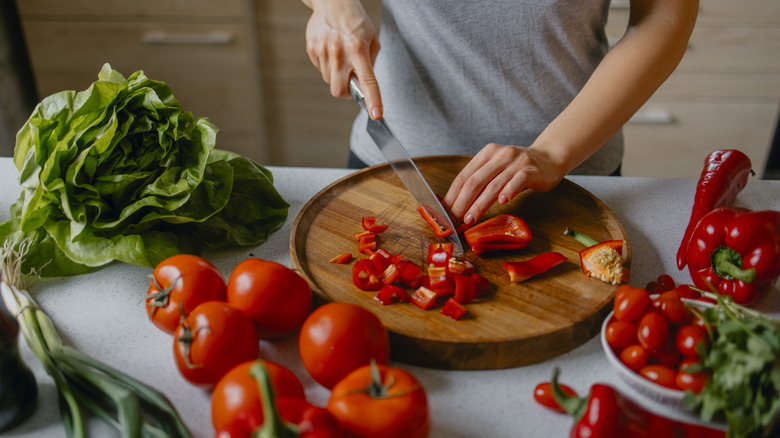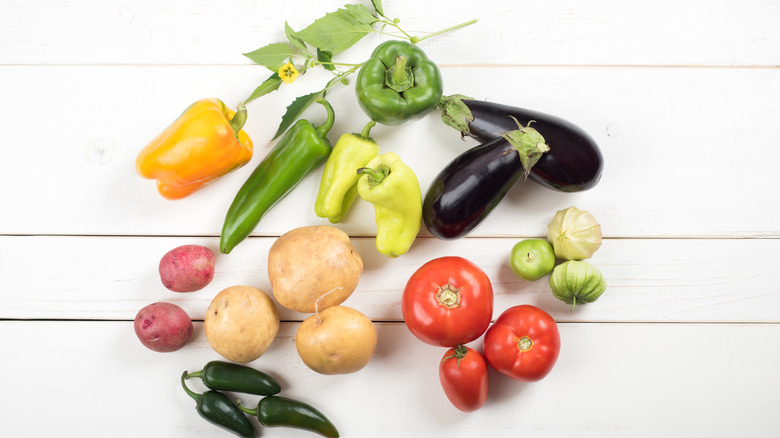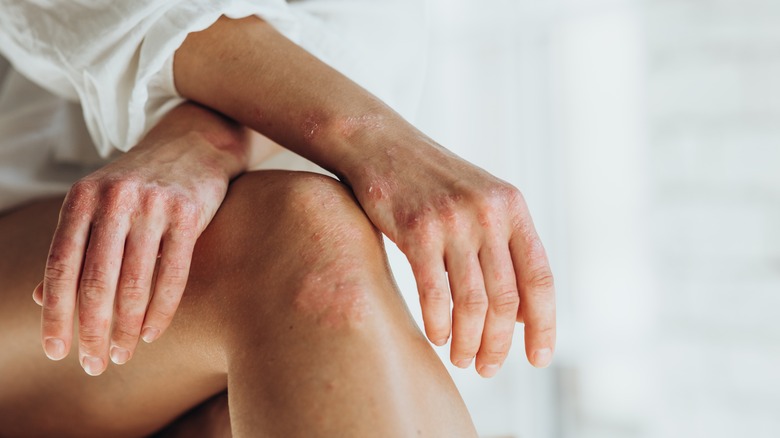Avoid Eating Peppers If You Have This Medical Condition
We may receive a commission on purchases made from links.
Peppers are one of those plants that have a myriad of different varieties. You have your black and white peppers that come from peppercorns (the Piperaceae family) and then you have the peppers that belong to something called the nightshade, or Solanaceae, family — bell peppers, jalapeños, habaneros, cayenne, banana peppers, chipotle, poblano, serrano, and pimentos.
The world is largely divided into two groups of people: those who enjoy spicy food and those who don't. Turns out, there's more than your level of spice tolerance to be thought about when it comes to one medical condition — psoriasis. Apart from the fact there are common foods to eat and foods to avoid for psoriasis, experts also recommend that you avoid the peppers that come under the umbrella of nightshade fruits and vegetables.
According to a 2017 study published in the journal Dermatology and Therapy, nightshades are thought to aggravate symptoms of immune-related disorders like psoriasis. Although the medical condition presents with various skin-related symptoms like patchy and cyclical rashes; itchy, burning, cracking skin; scaling spots; and soreness, psoriasis is a long-term condition that is thought to be caused by an immune system malfunction, where your immune system mistakenly attacks healthy skin cells. Even psoriatic arthritis, a type of arthritis linked with psoriasis, could be exacerbated with the consumption of nightshades.
Nightshades and psoriasis
There are a few different reasons why peppers could aggravate symptoms of psoriasis. For one, nightshade fruits and vegetables contain a compound called "solanine" which is thought to trigger digestive discomfort and inflammation in some people. This can be a problem for people with immune-system-related disorders like psoriasis. Capsaicin, also found in peppers and other nightshades, could also have an inflammatory effect that negatively affects some people who have psoriasis, although the topical application of capsaicin is thought to control the symptoms, according to some.
Perhaps this is why not all experts seem to agree that avoiding peppers is a necessity for everyone who has this medical condition. For instance, according to a dermatologist at Windsor Dermatology in East Windsor, New Jersey, Dr. Jerry Bagel (via Everyday Health), "Certain patients believe that if you avoid these vegetables [nightshades], you decrease your symptoms. I'm not so sure about that, but I'm not opposed to people trying it." Apart from peppers, nightshade vegetables and fruits include popular foods like tomatoes, eggplant, and potatoes.
Being allergic or sensitive to peppers or any other foods found in the nightshade family can also contribute to flares, per some experts. Speaking of peppers, what about black and white peppers?
Black and white peppers and psoriasis flares
According to chiropractor Kyle Loveless with Queen City Health Center in Matthews, North Carolina (via Loveless Health Solutions), a lot of patients who do allergy tests find that they are allergic to black and white pepper. With food allergies, you're essentially having an antibody response to the protein in these peppers, per the expert. "That's exactly what led to the psoriasis in the first place so we want to calm down the immune system, not give it so much stress and beat it up so much with the foods that we're eating," explained the chiropractic doctor.
Even so, just like with the nightshade peppers, the research and opinions seem mixed at best. For example, yet another chiropractic physician, John Pagano, has included recipes that contain black pepper in his book, "Healing Psoriasis: The Natural Alternative" and others have done the same.
Some experts recommend that working with your doctor to go on an elimination diet can help you figure out what foods you should avoid eating and which ones you can safely consume with this medical condition. Even so, if you've found peppers to be problematic, you're better off avoiding them completely. This advice is probably best for those who are still on the hunt for things that could trigger a psoriasis flare. Again, it's important to consult with your dermatologist before you add or remove anything from your diet.



